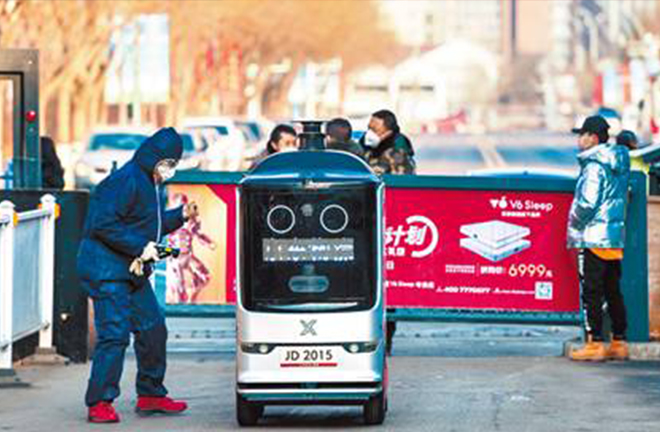Intelligent media strengthens efficiency of social governance

The intelligent robot developed by Jingdong Logistics delivers express deliveries to residents of Hohehot City during the time of COVID-19 pandemic outbreak. Photo: Lian Zhen/XINHUA
With the fourth wave of industrial revolution sweeping the world, big data and artificial intelligence (AI) are becoming new productive forces and factors of production. This technology will have a profound impact on production relationships in real life. The modernization of national governance systems and governance abilities is a major strategy in the face of the fourth industrial revolution and situations both at home and abroad. Among them, the modernization of social governance is a crucial aspect. Under this background, intelligent media's function as "new infrastructure" and the "new brain" of social governance is further highlighted and revealed.
Intelligent media represents a new form of social governance which will shape the future. Online education and online meetings during the COVID-19 outbreak period have become models for possible forms of social governance. In the future, online government and online tourism have become new fields with great potential for development; intelligent city and intelligent community platforms have become alternative spaces where social governance functions. Intelligent media in the broad sense has begun to show its latest form and function in the fields of future social governance.
Intelligent media also enhances the efficiency of social governance in a new way. To realize the modernization of social governance, new approaches and methods are the key, while efficiency and effect are used for verification. Intelligent media can improve the efficiency of data collection. During the anti-COVID 19 period, dynamic big data anti-pandemic platforms were formed by breaking data barriers. This may provide basis for scientific decision-making. Intelligent media also improves the accuracy of social governance. By using AI algorithms to identify criminals among a crowd, or detect suspected virus cases among mobile populations, the intelligent media can quickly optimize and enhance the efficiency of social governance by using a digital "magnifying glass" to identify features and determine targets.
The development of intelligent media also has uncertainties and contingencies. It is important to consider how to promote the coordinated and beneficial development of intelligent media and social governance modernization.
The first step is to further boost the layout of related intelligent media industries. Big data and AI industries need more policy and financial support from a national level. It is definitely necessary to avoid falling into the trap of blindly expanding industries or pursuing coordinated development. For example, in Southeast regions such as Zhejiang Province, where there is better service awareness and business environments, developing new media with government administration would be twice as successful with half the effort. In Xi'an, and other cities where culture and tourism boom, cultural and tourism big data can better boost industrial optimization.
The second step is to effectively promote R&D investment in basic key technologies. 5G technology, big data industries, artificial intelligence, etc. are not only the basic technologies to underpin intelligent media, but also what is required to modernize social governance.
In summation, intelligent media and the modernization of social governance have their own natural links for coordination. The government, academia, and industrial circles should further exchange ideas to increase information interconnection and build complementary advantage, so as to realize the strategy of national sustainable development.
Li Mingde is dean of School of Journalism and New Media at Xi'an Jiaotong University; Meng Shengjun is director of Department of Journalism at the university.
Edited by BAI LE

 PRINT
PRINT CLOSE
CLOSE